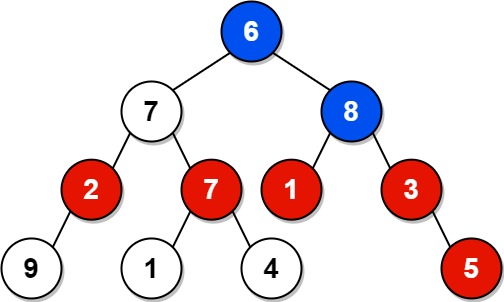- {x}
- Verbal Arithmetic Puzzle
- Running Total for Different Genders
- Decrypt String from Alphabet to Integer Mapping
- XOR Queries of a Subarray
- Get Watched Videos by Your Friends
- Minimum Insertion Steps to Make a String Palindrome
- Decompress Run-Length Encoded List
- Matrix Block Sum
- Sum of Nodes with Even-Valued Grandparent
- Distinct Echo Substrings
- Convert Integer to the Sum of Two No-Zero Integers
- Minimum Flips to Make a OR b Equal to c
- Number of Operations to Make Network Connected
- Minimum Distance to Type a Word Using Two Fingers
- Restaurant Growth
- Ads Performance
- Maximum 69 Number
- Read More...

Sum of Nodes with Even-Valued Grandparent
Given the root of a binary tree, return the sum of values of nodes with an even-valued grandparent. If there are no nodes with an even-valued grandparent, return 0.
A grandparent of a node is the parent of its parent if it exists.
Example 1:

Input: root = [6,7,8,2,7,1,3,9,null,1,4,null,null,null,5] Output: 18 Explanation: The red nodes are the nodes with even-value grandparent while the blue nodes are the even-value grandparents.
Example 2:

Input: root = [1] Output: 0
Constraints:
- The number of nodes in the tree is in the range
[1, 104]. 1 <= Node.val <= 100
1315. Sum of Nodes with Even-Valued Grandparent
Problem Description
Given the root of a binary tree, calculate the sum of the values of all nodes that have an even-valued grandparent. A grandparent is defined as the parent of a node's parent. If no nodes have an even-valued grandparent, return 0.
Approach: Depth-First Search (DFS)
The most efficient way to solve this problem is using a Depth-First Search (DFS) approach. We'll recursively traverse the tree, keeping track of the parent's value and the grandparent's value.
Algorithm:
-
Base Case: If the current node is
null, return 0. -
Recursive Step: Recursively call the DFS function on the left and right subtrees.
-
Grandparent Check: If the grandparent's value (passed as an argument) is even, add the current node's value to the sum.
-
Parent Update: Pass the current node's value as the new parent value for the recursive calls on its children.
-
Return: Return the accumulated sum.
Time and Space Complexity Analysis
- Time Complexity: O(N), where N is the number of nodes in the tree. We visit each node exactly once.
- Space Complexity: O(H), where H is the height of the tree. This is due to the recursive call stack. In the worst case (a skewed tree), H can be equal to N. In a balanced tree, H is log₂(N).
Code Implementation (Python)
# Definition for a binary tree node.
# class TreeNode:
# def __init__(self, val=0, left=None, right=None):
# self.val = val
# self.left = left
# self.right = right
class Solution:
def sumEvenGrandparent(self, root: TreeNode) -> int:
def dfs(node, parent_val, grandparent_val):
if not node:
return 0
total_sum = dfs(node.left, node.val, parent_val) + dfs(node.right, node.val, parent_val)
if grandparent_val % 2 == 0:
total_sum += node.val
return total_sum
return dfs(root, 0, 0) #Initial parent and grandparent values are 0
Code Implementation (Java)
/**
* Definition for a binary tree node.
* public class TreeNode {
* int val;
* TreeNode left;
* TreeNode right;
* TreeNode() {}
* TreeNode(int val) { this.val = val; }
* TreeNode(int val, TreeNode left, TreeNode right) {
* this.val = val;
* this.left = left;
* this.right = right;
* }
* }
*/
class Solution {
public int sumEvenGrandparent(TreeNode root) {
return dfs(root, 0, 0);
}
private int dfs(TreeNode node, int parentVal, int grandparentVal) {
if (node == null) {
return 0;
}
int sum = dfs(node.left, node.val, parentVal) + dfs(node.right, node.val, parentVal);
if (grandparentVal % 2 == 0) {
sum += node.val;
}
return sum;
}
}Code Implementation (C++)
/**
* Definition for a binary tree node.
* struct TreeNode {
* int val;
* TreeNode *left;
* TreeNode *right;
* TreeNode() : val(0), left(nullptr), right(nullptr) {}
* TreeNode(int x) : val(x), left(nullptr), right(nullptr) {}
* TreeNode(int x, TreeNode *left, TreeNode *right) : val(x), left(left), right(right) {}
* };
*/
class Solution {
public:
int sumEvenGrandparent(TreeNode* root) {
return dfs(root, 0, 0);
}
int dfs(TreeNode* node, int parentVal, int grandparentVal) {
if (!node) return 0;
int sum = dfs(node->left, node->val, parentVal) + dfs(node->right, node->val, parentVal);
if (grandparentVal % 2 == 0) sum += node->val;
return sum;
}
};The implementations in other languages (JavaScript, Go, TypeScript etc.) would follow a very similar structure, adapting the syntax and data structures specific to that language. The core algorithm remains the same.